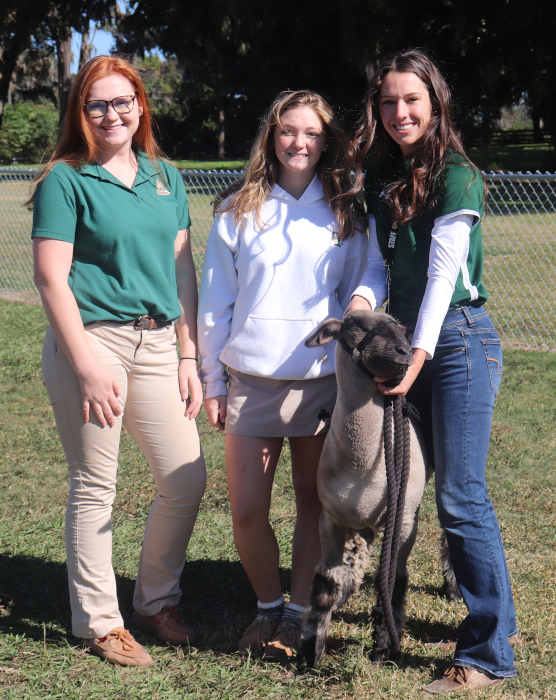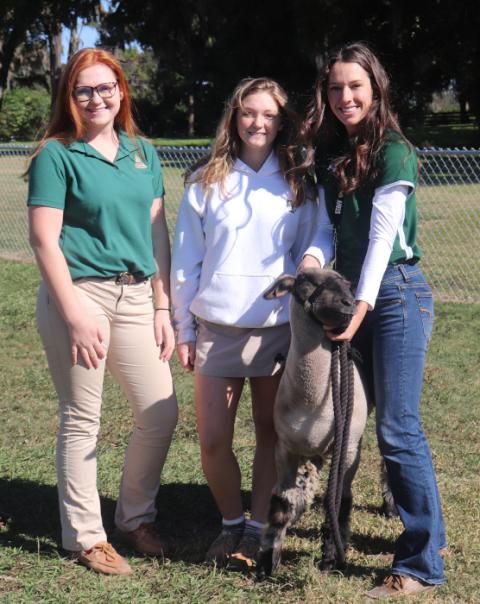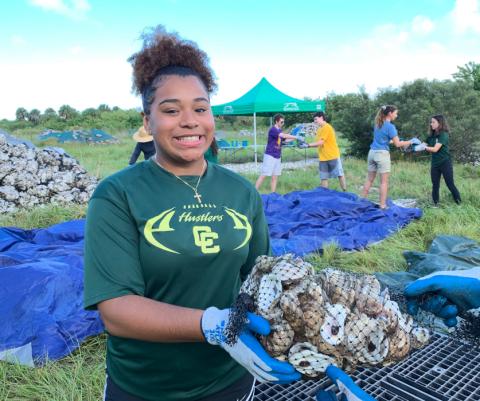
Students Allison Wyman and Ashley Sellers stand with teacher Taylor Wear, who started a chapter of the Future Farmers of America organization at Trinity Catholic High School in Ocala, Fla. The trio poses in 2019 with Murphy the lamb, a project of FFA. (CNS/Maurice Beaulieu, Florida Catholic)

Students Allison Wyman and Ashley Sellers stand with teacher Taylor Wear, who started a chapter of the Future Farmers of America organization at Trinity Catholic High School in Ocala, Fla. The trio poses in 2019 with Murphy the lamb, a project of FFA. (CNS/Maurice Beaulieu, Florida Catholic)
Raising ranch animals and gardening is common among the residents in rural Ocala, as is the devotion to Christianity as witnessed on the numerous properties' depictions of the three crosses on Calvary.
Trinity Catholic High School in Ocala, which rests on several acres of beautiful landscape housing multiple buildings, a massive football stadium, and even a small, fenced-off section to keep the livestock safe, merges Catholicism and agriculture into one learned experience that serves its students long after they graduate.
For Trinity agriculture teacher Taylor Wear, every day is a chance to celebrate her Catholic faith by instructing her students about the benefits of farming. Wear, an ambitious, rookie teacher at Trinity with a personal history of nurturing farm animals and who holds an academic degree in the field, chose to helm the new agricultural program at Trinity Catholic — the Future Farmers of America, or FFA.
"It is an agriculture course where students will learn everything from integrated pest management to gardening practices to animal science to safety in the field to agribusiness," Wear said, noting the various paths the course covers. She also will instruct her students "how to have a proper interview and apply for a job."
Erika Wikstrom, principal of Trinity Catholic, noted Wear's relentless motivation to the project and said the school is excited about the program and the work.
"(Wear's) passion and commitment to developing the program has been a blessing to our students and community, allowing an opportunity for our students to work with local farms in Ocala," Wikstrom told the Florida Catholic, newspaper of the Diocese of Orlando.
If students do intend to pursue a career in agriculture, Wear ensures them there are numerous job possibilities, ranging from "a feed sales rep to a fertilizer sales rep to a veterinarian," Wear said. "There is a huge range of anything you want to do."
Although Wear controls the program, "the FFA is a club run by the students and they do community service projects," she said. "They go to competitions and leadership conferences."
The FFA also provides awards and scholarships opportunities for members; some scholarships reach several hundred dollars.
Wear and a couple members of the FFA staff gave the Florida Catholic a tour into the livestock section of the campus to gain knowledge of how they raise their animals and develop produce in the greenhouse.
Ashley Sellers is president of Trinity Catholic's FFA chapter. The junior and future veterinarian who hopes to study animal science at the University of Georgia, enjoys the competitiveness the program brings. "(The FFA) really puts us out there to compete with all the other schools in the state of Florida," she said. Her passion is to always represent her school at the top spot.
Allison Wyman, a senior and a reporter for the school who will study in-state for her nursing degree, appreciates the knowledge the program provides for Trinity's students. "It's a lot of fun," she said. "It teaches kids a lot more than you think."

A student from Melbourne Central Catholic High School in Florida poses with oysters near other students in 2019. The school partners with the Brevard Zoo to assist in the "Restore Our Shores" program, which works to create oyster beds used to filter out pollutants in area coastal waters. (CNS/courtesy Melbourne Central Catholic High School)
As the tour group neared the farm gate, a distinct "baa" could be heard, calling out over the rolling, green hills of the school campus. It was the excited sound of the school's unofficial mascot, Murphy the lamb. The students get experience in raising animals.
With any luck and the proper funds in the future, Wear would like to have a barn built at the back end of the school grounds to house a few steers, broadening the educational possibilities of the FFA program.
Murphy's pen was sectioned off, keeping him gated and available for petting. When allowed out, the lamb behaved well, grazing a little and staying by Wear's side. Although Murphy will likely be given away in the spring of 2020, he will have an intricate part in Trinity's Christmas play, as will Wear.
"Murphy is a chapter lamb," Sellers said of his significance. "Everyone in the chapter helps take care of him and helps feed him and makes sure he has clean water. He is a big group project. We have a couple girls from the club showing him at the fair coming in February."
In another section, several young chickens cavorted with one other. Wear and her students had witnessed the birth of each chicken a few weeks prior, as the raising of the baby chicks is part of the FFA course, too.
The greenhouse has a full-working irrigation system that flows throughout the entire structure, spraying water on each individual broccoli, head of lettuce and leaf under its roof. However, Murphy's personal bale of food grain and alfalfa hay are kept dry. When each veggie becomes ready to eat, Wear will give them away.
"We harvest our own food," Wyman said. "We have tomatoes, peppers, and basil."
Reflecting how their Catholic faith works well with the FFA program, each one had their own reason to credit the Lord.
"God gave us everything," Wyman replied when asked why her participation in the program matters to her faith.
Wear agrees with her students. "To me," she said, "we are stewards of the land and it talks about that in the Bible. I feel that the more you take care of what God has given you and you use it to the best of your ability and help provide safe land and food practices for everyone else — that is really the most down to earth and best thing I feel you can do."
Sellers wants others to know the FFA program isn't only about farming, but incorporates Catholic faith in its actions, as well.
"This program really relates to Christianity a lot, more than people realize because we are just using the gifts that God has given us," she said. "We are utilizing them to the absolutely best of our abilities. He gave us them for a reason and we are using them to help all people."
(Beaulieu is on the staff of the Florida Catholic, newspaper of the Diocese of Orlando.)
Advertisement




